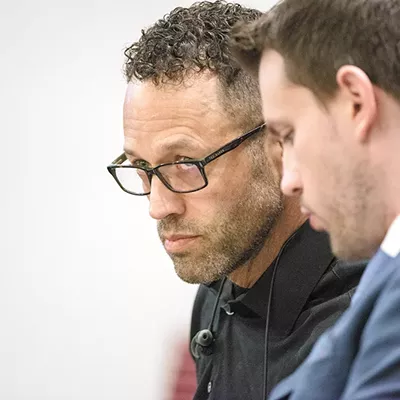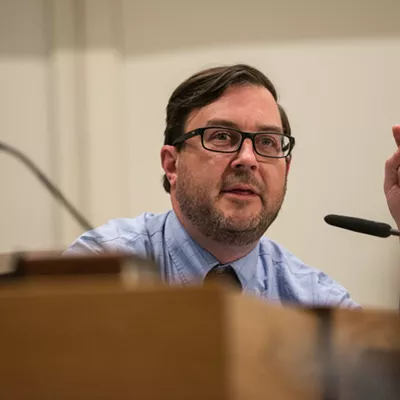
Ultimately — after a tumultuous year where the city's human resources department was the target of intense criticism — only a single member of the Spokane City Council voted against confirming HR veteran Chris Cavanaugh as the department's new director.
That "no" vote, from city councilwoman Karen Stratton, wasn't because of who Cavanaugh is. It was because of who her husband's brother is.
"I have had a handful of employees express concerns to me," Stratton says.
You see, Chris Cavanaugh's brother-in-law, Joe Cavanaugh, is the head of the American Federation of State, County and Municipal Employees, Local 270, the largest city union. And that's why Stratton worries about at least the appearance of a conflict of interest.
"I think we have some conflicts there that are going to prohibit employees from coming forward [to human resources]," Stratton says. "If I'm a Local 270 employee and I have a problem with Joe Cavanaugh, am I going to go to Chris Cavanaugh? I don't know."
LINES, BRIGHT AND HAZY
In a city with approximately 2,000 employees, of course, it's not surprising that a few of them are related.
Last month, for example, Spokane Police Chief Craig Meidl's wife, Lt. Tracie Meidl, was appointed to investigate officer misconduct. Even though she won't be reporting directly to her husband, critics of the police department reacted with skepticism.
But the human resources department is unique in the way it impacts nearly every other department in the city.
When there's a complaint — about your boss, a co-worker or working conditions — HR typically investigates. HR sits at the negotiating table as unions hammer out their labor contracts with the city. It's also the department which interprets that contract language when questions arise.
So when an HR director has a family member in a city department, it can complicate the job.
That was the case for the previous HR director, Heather Lowe. Her husband was a police officer with the Spokane Police Department from 2013 until failing his probationary period in April of 2015.
Because of the danger of a perceived conflict of interest, Lowe separated herself from nearly everything involving the police department, including contract negotiations, labor questions and handling complaints. She even wrote a letter in December of 2013 explicitly outlining her recusal.
But there were complications to Lowe keeping her distance.
For example, when former police department spokeswoman Monique Cotton alleged that former police chief Frank Straub had sexually harassed her, the city attorney told City Administrator Theresa Sanders that she couldn't initially discuss the accusation with Lowe, because of Lowe's conflict of interest.
"'Heather cannot be involved,' is what [the city attorney] said," Sanders told independent investigator Kris Cappel.

Ultimately, Cappel's final report detailed serious problems with the HR department: The HR department "routinely overlooked" its own procedures. It had enforced its policies inconsistently. The policies themselves, Cappel concluded, were often vague and even self-contradictory.
After Lowe left the city in June, it's been up to Chris Cavanaugh to help lead the effort to rewrite the policies, and improve how HR applies them.
In the midst of all this, there are two potential conflicts that Cavanaugh has to navigate. First, Cavanaugh's husband of a dozen years, Mike Cavanaugh, is the warehouse foreman for the water department. (She actually met him across the negotiations table — a love story that's not all that unusual at HR conferences, she says.)
Second is Mike's brother, Joe Cavanaugh, who's been president of Local 270 for more than a decade. Local 270 represents around half of the city of Spokane's employees — including drivers, probation officers, engineering technicians and clerical staff. In this sense, he has much more influence over a far larger part of the city than Lowe's husband ever did as a rookie cop. Multiple requests for comment from Joe Cavanaugh were not returned.
"I will not engage at any point of time in labor-negotiation contracts [with Local 270]," Chris Cavanaugh promises. "That in my mind is a bright line."
But unlike Lowe, Chris Cavanaugh has not written a letter recusing herself from dealing with the other areas when human resources intersects with Local 270. She sees her own potential conflict as different from Lowe's.
"This is my brother-in-law, not my husband," Cavanaugh explains.
She notes that human resources' decisions go through multiple levels of scrutiny — including soon by a new "labor relations manager" who will handle much of the work with labor unions.
"Anything that would directly impact [Joe Cavanaugh], I will step away," she says. She notes that recently hired HR analyst Jennifer Jackson planned to take a similar approach. Jackson's husband is David Lewis, president of the Spokane Managerial and Professional Association.
Lewis, concerned about maintaining trust and transparency, says he's stepping down from his union role in order to eliminate any concerns that his wife's new role could pose.
"That's just too much baggage," Lewis says. "Even though we have the processes in place, I now realize that's not going to be enough."
THE CONFLICT OF APPEARANCE
Often, city councilman Breean Beggs says, the trouble with the appearance of a conflict of interest is the way it hands ammunition to cynics.
"People who are already disgruntled folks seize on things like that to distract us from decisions," Beggs says. "Suddenly you're talking about who's married to who, instead of 'Is that a bad idea or not?'"
Beggs suggests amending the city's ethics code to provide more guidance.
After all, even Stratton herself has to navigate the appearance of a conflict: Her husband, Chris Wright, is president of the Spokane Park Board, a volunteer position. (Inlander Publisher Ted S. McGregor also serves on the board.) She says she's spoken with the city attorney's office frequently to make sure she's abstaining on pertinent votes.
"It's tricky," Stratton says. "I always make sure I err on the side of caution."
Stratton, however, says that some employees feel the problems with HR are embedded deeply within the culture, and worry that the Cavanaugh pick won't be enough of a shift.
"There were a lot of people who would have preferred this be a national search," Stratton says.
She says the city needs to clearly communicate about how it's navigating around family relationships in circumstances like those of the Meidls and the Cavanaughs.
"Have a citywide communication from HR that says we recognize that these situations may cause concern," Stratton says. "[Say] 'Here's what we're doing to alleviate those concerns.'"
Chris Cavanaugh, for her part, urges anyone with concerns to speak with her. Look at her record at the city, she says, and her ability to win trust from every single sector, ranging from line workers to department heads to elected officials.
"I think if people look at my past history — and talk to people who have dealt with me for 18 years — they will be comforted, and understand that I think the city made a very good choice," she says. ♦
This story has been updated online to correct an incorrect date in the original story.


























